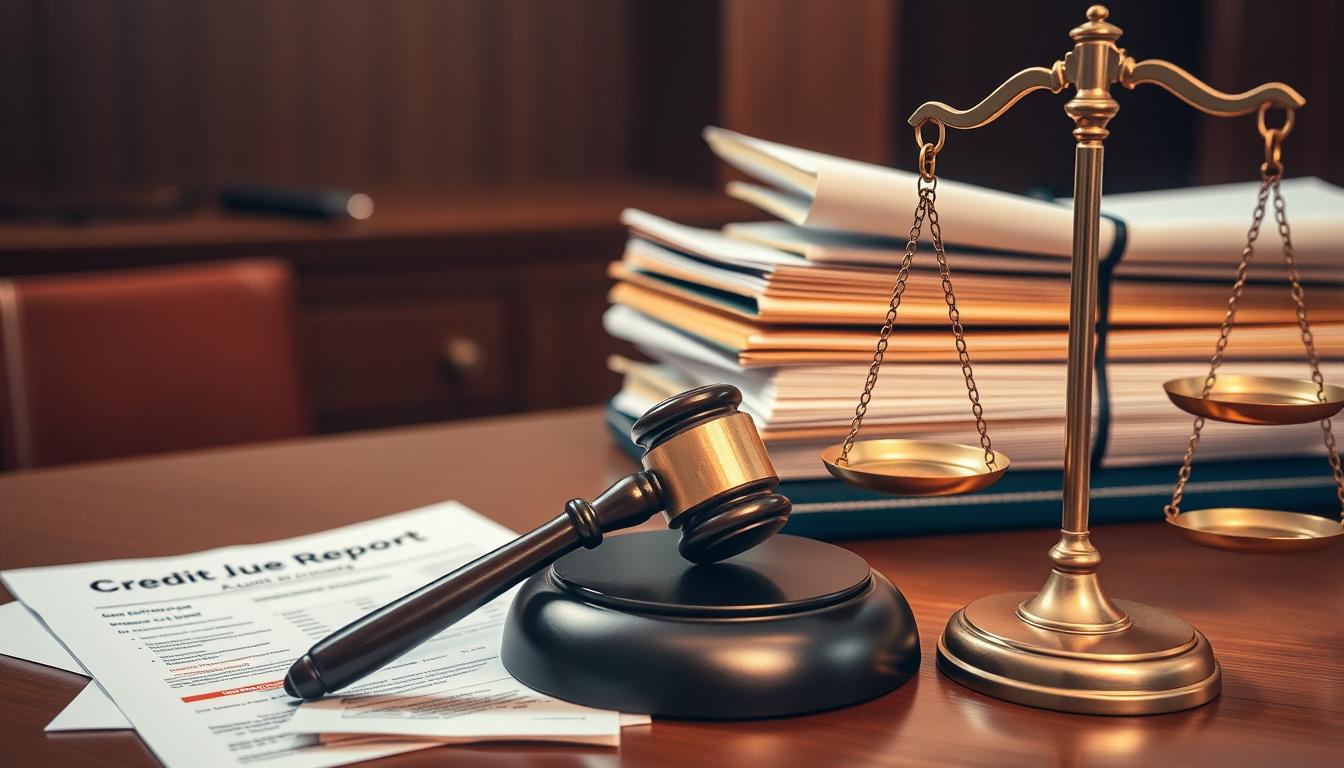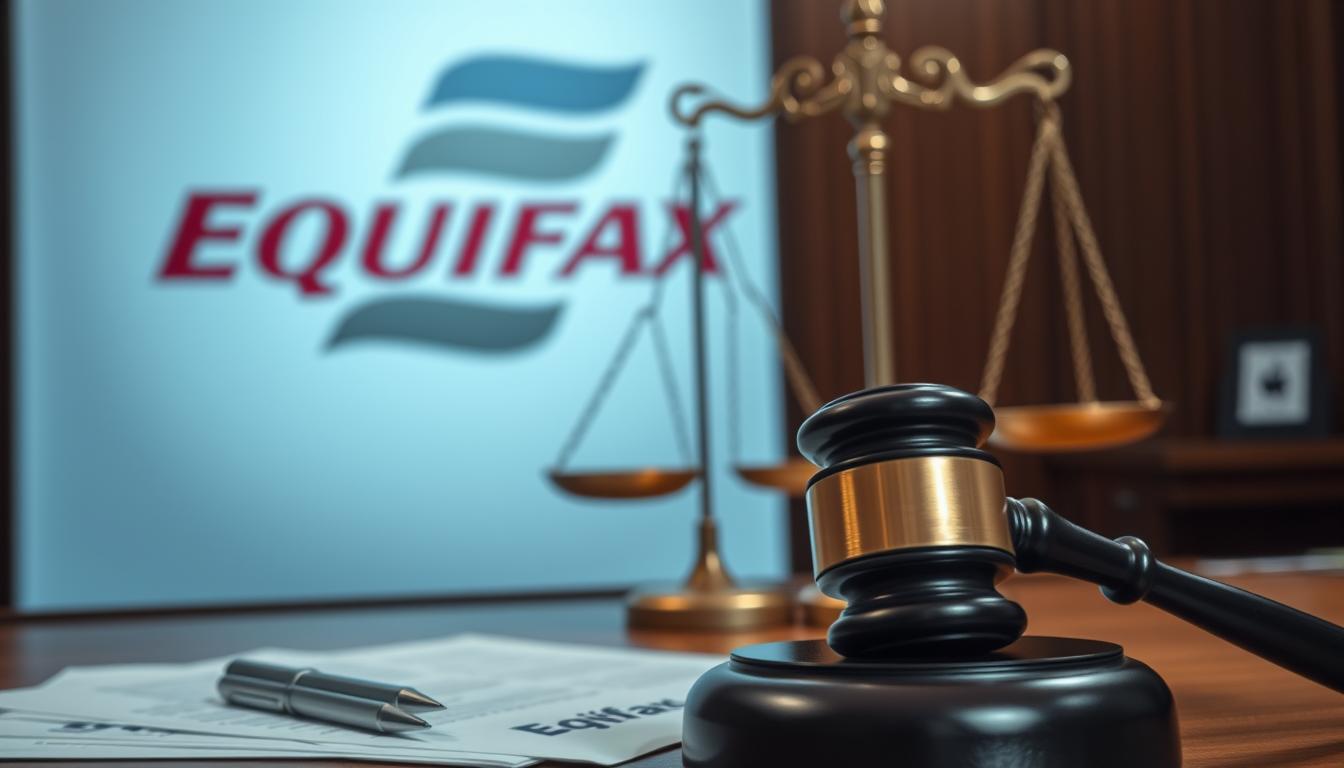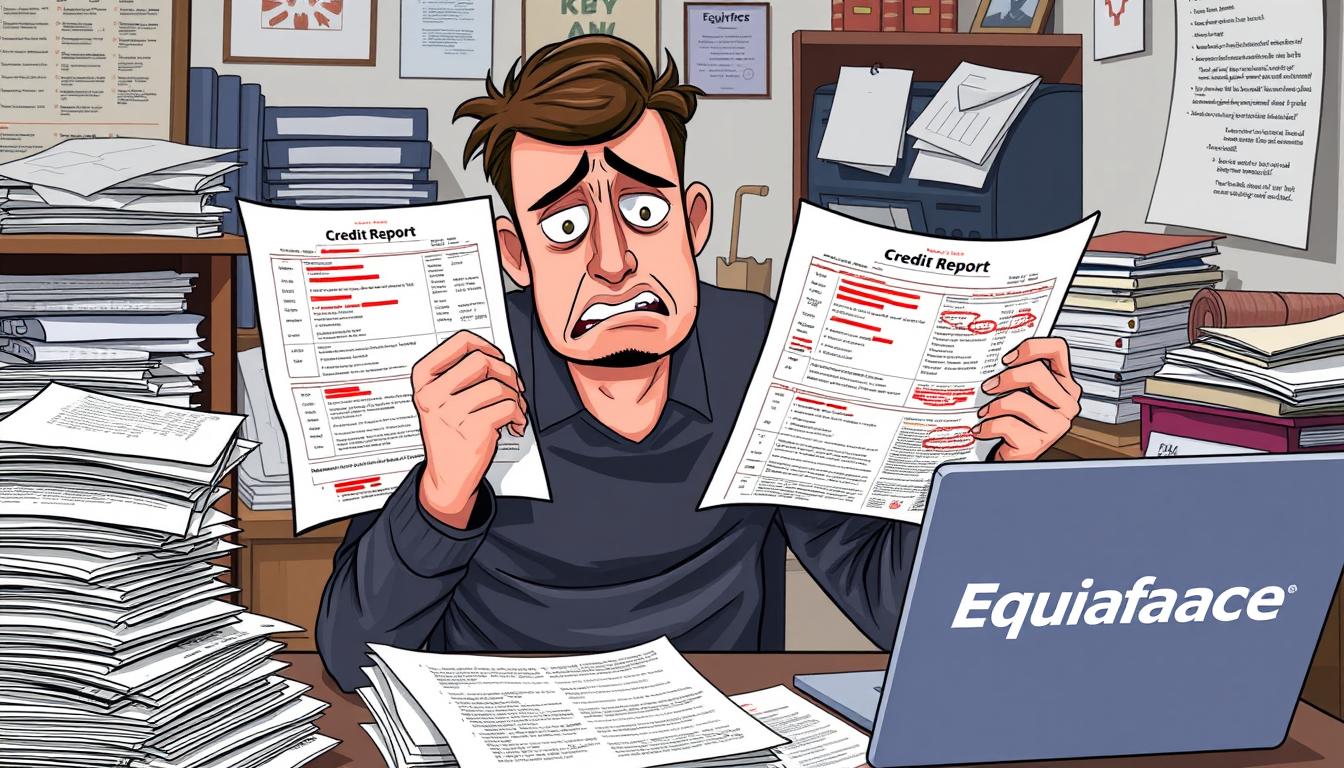Equifax, a major credit reporting agency, often faces legal challenges due to data breaches and credit report errors. Many consumers find it necessary to take legal action against Equifax to safeguard their finances. This guide explores the process of suing Equifax and outlines steps to protect your consumer rights.
We’ll discuss common reasons for filing a lawsuit and provide insights into building a strong case. You’ll learn about gathering evidence, choosing legal representation, and understanding potential damages you can claim.
Key Takeaways
- Understand your rights under consumer protection laws when it comes to credit reporting and identity theft.
- Gather evidence of Equifax’s errors, data breaches, or identity theft to build a strong case.
- Learn the steps to file a lawsuit against Equifax, including choosing the right legal representation.
- Explore the potential damages you can claim in an Equifax lawsuit, such as identity theft, credit score damage, and emotional distress.
- Stay informed about the latest developments in Equifax-related lawsuits and consumer rights.
Understanding Equifax and Your Credit Report Rights
Equifax is a major credit reporting agency in the United States. It compiles and maintains consumer credit reports. These reports show your credit history, payment patterns, and outstanding debts.
Understanding Equifax’s role is crucial for your credit data accuracy. It’s also important to know your rights as a consumer. This knowledge helps protect your credit information privacy.
What is Equifax and Its Role in Credit Reporting
Equifax collects and analyzes financial information about individuals and businesses. It uses this data to create credit reports and scores. Lenders, landlords, and employers use these tools to evaluate creditworthiness.
As a consumer, you should know how Equifax uses your credit information. This awareness helps you manage your credit profile effectively.
Consumer Protection Laws and Your Rights
The Fair Credit Reporting Act (FCRA) protects consumers’ credit report rights. It’s a federal law that gives you several important rights. These rights help you maintain accurate credit information.
Under the FCRA, you can access your credit report for free once a year. You can also dispute any errors you find on your report.
The law limits how your credit report can be used. It requires notification if your report affects a credit decision. You can also get your credit score if it’s used in decisions.
- Access your credit report from Equifax and the other two major credit bureaus for free once a year
- Dispute any errors or inaccuracies found on your credit report
- Limit the use of your credit report for certain purposes, such as employment decisions
- Be notified if information in your credit report has been used against you in a credit decision
- Receive a copy of your credit score if it was used in a credit decision
Knowing these rights helps you protect your equifax credit report. You can take an active role in maintaining its accuracy and integrity.
“Your credit report is one of the most important financial documents you have, so it’s crucial to keep a close eye on it and address any issues that arise.”
Common Reasons to Sue Equifax
Consumers may file a lawsuit against Equifax for various reasons. These include credit report errors, data breaches, and credit-related issues. Such problems can cause financial harm or damage to an individual’s creditworthiness.
Credit Report Errors
Inaccuracies on a consumer’s credit report are a frequent cause for suing Equifax. These errors can negatively impact a person’s credit score. This makes it hard to get loans, credit cards, housing, or employment.
Consumers can dispute these errors with Equifax. If the company fails to correct the issues, legal action may be needed.
Equifax Data Breach and Identity Theft
The 2017 Equifax data breach exposed millions of Americans’ personal information. This left many vulnerable to identity theft and financial fraud. Consumers who suffered damages from this breach may have grounds to sue.
Other Credit-Related Issues
Consumers might also sue Equifax for failing to investigate disputes properly. Other reasons include unlawful collection practices or violations of consumer protection laws.
| Reasons to Sue Equifax | Examples |
|---|---|
| Credit Report Errors | Inaccurate personal information, incorrect account history, or unwarranted negative items |
| Equifax Data Breach and Identity Theft | Fraudulent accounts opened, unauthorized credit inquiries, or other financial damages |
| Other Credit-Related Issues | Failure to investigate disputes, unlawful collection practices, or violations of consumer protection laws |
Knowing these common reasons can help consumers determine if they have a valid case. They can then take steps to protect their rights and seek compensation.

Gathering Evidence for Your Equifax Lawsuit
To build a strong case against Equifax, you need thorough documentation and compelling evidence. This guide will help you document credit report errors and collect proof of identity theft.
Meticulous gathering and organizing of proof is crucial. This applies whether you’re disputing credit report errors or seeking justice for identity theft.
Documenting Credit Report Errors and Disputes
Start by obtaining and reviewing your Equifax credit reports. Look for errors like incorrect personal information, account details, or fraudulent accounts.
Keep detailed records of all disputes with Equifax. Include copies of correspondence, dates, and any responses you receive.
- Obtain your Equifax credit reports and thoroughly review them for errors.
- Document any discrepancies, including incorrect personal information or account details.
- Keep detailed records of all disputes filed with Equifax, including copies of correspondence.
- Persevere through the dispute process and maintain meticulous documentation.
Collecting Proof of Identity Theft or Fraud
For identity theft or fraud related to Equifax, solid proof is crucial. Gather police reports and documentation of unauthorized accounts or transactions.
Keep records of all communication with credit agencies or financial institutions. Maintain copies of all supporting evidence.
- Obtain police reports documenting any incidents of identity theft or fraud.
- Gather documentation of unauthorized accounts or transactions related to Equifax.
- Collect copies of all correspondence with credit agencies, financial institutions, and other relevant parties.
- Maintain a detailed record of all identity theft or fraud-related incidents and actions taken.
Diligent documentation of errors, disputes, and evidence builds a compelling case against Equifax. This careful preparation is crucial for pursuing justice and potential compensation.
| Document Type | Relevance | Obtain From |
|---|---|---|
| Equifax Credit Reports | Identify errors and inaccuracies | Equifax.com or AnnualCreditReport.com |
| Dispute Correspondence | Demonstrate attempts to resolve issues | Personal records, Equifax |
| Police Reports | Prove identity theft or fraud incidents | Local law enforcement |
| Financial Statements | Substantiate unauthorized transactions | Banks, credit card issuers |
How Do I Sue Equifax
Facing issues with your Equifax credit report? You might be thinking about legal action. Suing Equifax can be tricky, but knowing the steps can help.
Understanding the process is key to navigating it successfully. Let’s explore how you can take on this credit reporting giant.
Steps to File a Lawsuit Against Equifax
- Gather all relevant documentation: Collect any evidence of the credit report errors or identity theft, including copies of your credit report, dispute letters, and any communications with Equifax.
- Determine the legal basis for your claim: Review consumer protection laws, such as the Fair Credit Reporting Act (FCRA), to understand your rights and the potential grounds for your lawsuit.
- File a complaint with the appropriate government agencies: Consider filing complaints with the Federal Trade Commission (FTC), the Consumer Financial Protection Bureau (CFPB), or your state’s consumer protection office.
- Initiate the lawsuit: Consult with a qualified attorney who specializes in consumer rights and credit reporting issues to help you file the lawsuit and navigate the legal proceedings.
Choosing the Right Legal Representation for Your Equifax Lawsuit
To sue Equifax effectively, you need top-notch legal help. Look for a lawyer with experience in Equifax cases.
Your attorney should know consumer protection laws inside out. They should have won similar cases before.
A good lawyer will guide you through how to sue equifax and steps to file lawsuit against equifax.
| Criteria | Importance |
|---|---|
| Experience with Equifax lawsuits | High |
| Knowledge of consumer protection laws | High |
| Proven track record of successful cases | High |
| Transparent communication and client-focused approach | Medium |
| Reasonable fee structure | Medium |
Following these steps can boost your chances of winning against Equifax. With the right lawyer, you can hold Equifax responsible.
Remember, your goal is to fix credit report issues or identity theft problems. A solid strategy is key to success.

Equifax Data Breach Lawsuits
The 2017 Equifax data breach was a major cybersecurity incident. It affected millions of consumers. This massive breach sparked many lawsuits against Equifax, the credit reporting agency responsible.
Understanding this breach and its legal effects is vital. It helps protect financial well-being and hold Equifax accountable.
Understanding the Equifax Data Breach
In September 2017, Equifax revealed a major hack. Hackers accessed personal and financial data of over 147 million Americans.
The stolen data included names, Social Security numbers, and birth dates. Some driver’s license numbers and credit card details were also taken.
This breach shattered consumer trust. It led to investigations and legal actions against Equifax.
| Key Facts About the Equifax Data Breach | Impact |
|---|---|
|
|
The Equifax breach sparked many equifax data breach lawsuits. Consumers want Equifax to answer for failing to protect their data.
These lawsuits aim to address damages suffered by victims. They also push for stronger consumer protection and data security standards.
“The Equifax data breach was a wakeup call for all Americans, highlighting the urgent need for stronger consumer protections and cybersecurity measures in the credit reporting industry.”
Equifax Credit Report Errors and Disputes
Mistakes on your Equifax credit report can hurt your finances. These errors can lead to loan denials and higher interest rates. Luckily, you can dispute and fix any errors on your Equifax credit reports.
Understanding Your Rights
The Fair Credit Reporting Act (FCRA) protects consumers. It requires Equifax to investigate disputes and fix inaccurate information. You have the power to challenge errors and get them resolved quickly.
The Dispute Process
To dispute an Equifax credit report error, you can follow these steps:
- Review your Equifax credit report carefully and identify any inaccuracies.
- Gather supporting documentation, such as payment records or identity verification documents.
- Contact Equifax directly, either online, by mail, or by phone, and submit your dispute.
- Equifax must investigate the dispute and respond within 30 days.
- If the dispute is resolved in your favor, Equifax must correct the error on your credit report.
By disputing equifax credit report errors, you protect your credit score. This helps ensure your report accurately shows your financial history. It also safeguards your creditworthiness for future opportunities.
| Common Equifax Credit Report Errors | Potential Impact |
|---|---|
| Accounts that don’t belong to you | Damaged credit score, denied loans, higher interest rates |
| Incorrect account balances or payment histories | Inaccurate credit utilization ratio, lower credit score |
| Erroneous personal information (name, address, etc.) | Confusion, difficulty obtaining credit or resolving issues |
Keep your credit file accurate by disputing equifax credit report errors. This protects your financial well-being. It also improves your chances of getting good credit terms.

“Monitoring your credit report and promptly addressing any equifax credit report errors is essential for maintaining a healthy financial profile.”
Equifax Identity Theft and Fraud Cases
The Equifax data breach has heightened the risk of identity theft and fraud. Millions now face potential unauthorized credit card applications and fraudulent loan requests. This security breach exposed personal and financial information, making consumers vulnerable to various financial misuses.
Protecting Your Identity After a Breach
Safeguarding your identity after the Equifax data breach is crucial. Here are key steps to protect yourself:
- Monitor your credit reports regularly from the three major credit bureaus (Equifax, Experian, and TransUnion) to spot any suspicious activities or unauthorized accounts.
- Place a credit freeze on your credit file to restrict access to your credit report, making it more difficult for identity thieves to open new accounts in your name.
- Enroll in credit monitoring and identity theft protection services to receive alerts about any changes to your credit profile and receive assistance in the event of identity theft.
- Be vigilant for phishing attempts, where scammers may try to trick you into revealing your personal information. Never respond to unsolicited emails or phone calls requesting sensitive data.
- Consider setting up fraud alerts on your credit file, which will require creditors to verify your identity before opening new accounts.
Taking these steps can greatly reduce the risk of equifax identity theft and equifax fraud. You’ll be better protected after the Equifax data breach.
These actions will help secure your personal information. Stay alert and proactive to keep your identity safe.
| Action | Description |
|---|---|
| Credit Freeze | Restricts access to your credit report, making it harder for identity thieves to open new accounts in your name. |
| Credit Monitoring | Alerts you to any changes in your credit report, allowing you to quickly identify and address suspicious activity. |
| Fraud Alert | Requires creditors to verify your identity before opening new accounts, adding an extra layer of protection. |
“Protecting your identity after a data breach like the Equifax incident is crucial to prevent equifax identity theft and equifax fraud. Taking proactive steps can significantly reduce your risk and give you peace of mind.”
Equifax Credit Monitoring and Credit Score Accuracy
A healthy credit score is vital in today’s financial world. Equifax, a major credit reporting agency, manages consumer credit information. Understanding your Equifax credit report and score is key to financial well-being.
Equifax credit monitoring services offer regular score updates and alerts for suspicious activity. These tools help you spot and fix discrepancies quickly. Staying informed about your credit is crucial.
However, Equifax credit scores may sometimes be inaccurate. Errors can occur due to data entry mistakes or outdated information. Regular review of your credit report is essential.
| Key Factors | Equifax Credit Monitoring | Equifax Credit Score Accuracy |
|---|---|---|
| Importance | Vital for monitoring credit health and identifying potential identity theft | Crucial for ensuring accurate financial decision-making |
| Potential Issues | Failing to subscribe to credit monitoring services | Inaccuracies in credit reports, data entry errors, outdated information |
| Recommended Actions | Enroll in Equifax credit monitoring to stay informed about your credit status | Regularly review Equifax credit report and dispute any errors or discrepancies |
Grasping the value of Equifax credit monitoring is crucial. It helps protect your financial health. Regularly check your credit report and dispute any errors you find.

Consumer Rights and Equifax Lawsuits
Equifax, a major credit reporting agency, must follow strict regulations and consumer protection laws. These laws safeguard your rights. Legal remedies are available if you’ve been affected by Equifax’s actions.
What Damages Can You Claim?
Equifax’s negligence, data breaches, or credit report inaccuracies may entitle you to compensation. You might be able to claim various types of damages in an Equifax lawsuit.
- Actual damages, such as out-of-pocket expenses, lost time, and financial harm caused by the incident
- Statutory damages, which are set amounts defined by law for certain violations
- Punitive damages, intended to punish Equifax for egregious misconduct and deter similar behavior in the future
- Attorneys’ fees and court costs, which can be recovered if you prevail in your lawsuit
Your case’s nature and state laws determine the specific damages you can claim. An experienced attorney can help you understand your rights. They can also assist in maximizing your potential recovery.
| Damage Type | Description | Potential Recovery |
|---|---|---|
| Actual Damages | Verifiable financial losses, such as out-of-pocket expenses and lost time | Varies based on individual circumstances |
| Statutory Damages | Fixed amounts defined by law for certain violations, such as the Fair Credit Reporting Act | Up to $1,000 per violation |
| Punitive Damages | Intended to punish Equifax for egregious misconduct and deter similar behavior | Varies based on the severity of the misconduct |
| Attorneys’ Fees and Court Costs | Legal expenses incurred in pursuing the lawsuit | Fully recoverable if you prevail |
The consumer rights equifax lawsuits and damages for equifax lawsuit can be complex. Seek guidance from a qualified attorney. They can help you navigate the legal process and protect your rights.
“Equifax’s actions have had a significant impact on millions of consumers, and they must be held accountable. Pursuing legal action is one way individuals can seek justice and recover the damages they’ve suffered.”
Conclusion
Consumers can hold Equifax accountable for credit report errors and data breaches. Understanding your rights is key to seeking justice. You can sue Equifax and navigate the legal process effectively.
We’ve covered reasons to sue Equifax and how to gather evidence. We’ve also explained the steps for filing a lawsuit. The Equifax data breach case highlights the importance of protecting yourself.
Your credit report and personal info are crucial for financial health. Don’t hesitate to act if Equifax has harmed you. Standing up for your Equifax consumer rights can lead to compensation.
Taking legal action also helps hold Equifax accountable. This can prevent future breaches and errors. Your efforts contribute to better practices in credit reporting.

